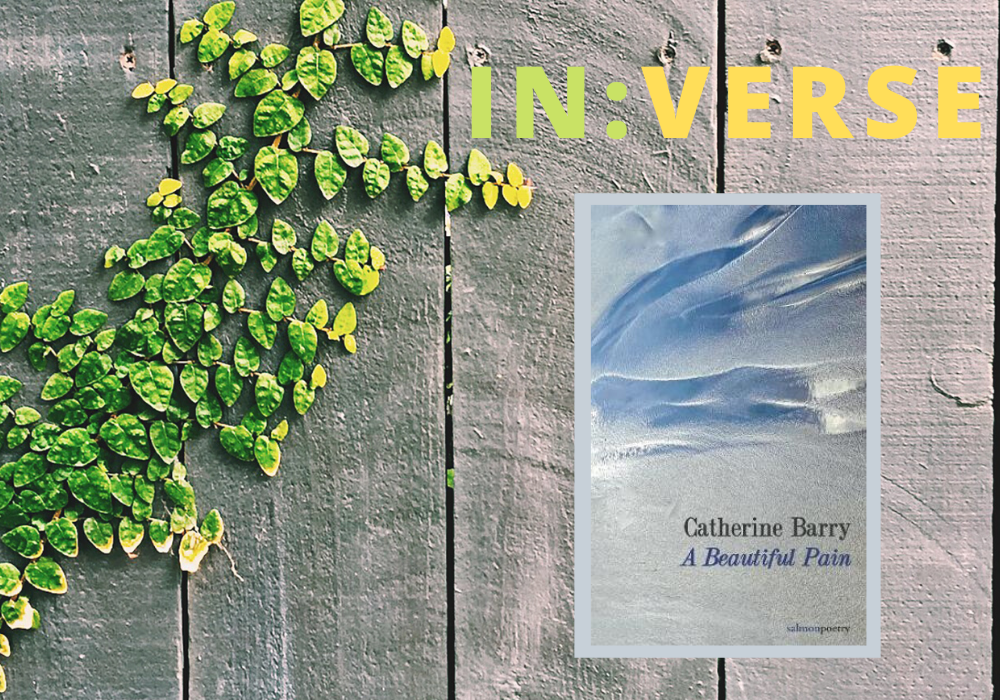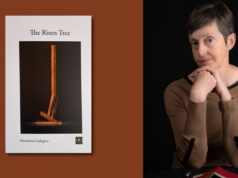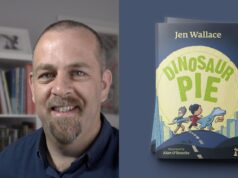
A Beautiful Pain.
by Catherine Barry |Salmon Poetry | 89pp | €12 pb | 9781912561841.
review by Fred Johnston
Salmon are publishers of my poetry, so I must declare the interest. Dublin-born Catherine Barry is one of those writers, and we have many, who write and publish steadily and yet do not court the media circus, thus remaining under what passes for our literary radar. I remember many years ago novelist Lee Dunne telling me that the truest writer he had known was a man who wrote whole novels and never succeeded in being published—the point being that such determination was a sign of a genuine writer. Barry has published novels and short stories and had drama presented on stage in London and Paris. These days, ‘working-class’ writing has been ‘discovered’ and given the status usually awarded to an archaeological find. One wonders whether Barry would be lumped into this unique category—or whether she’d care.
For this work should be noticed. And read, unlabelled. Her life experience oils her literature. It’s Dublin writing, no frills, unacademic, straight and honest, without the patronising spin to which we’ve become accustomed. The House That Jack Built (2001) concerned her harrowing descent into alcoholism, and her follow-up, Charlie And Me, was about her recovery and a figure who featured prominently throughout it. These days, TV programmers make ‘reality’ shows out of this sort of thing, featuring over-pampered ‘celebs’. Barry went down into the murky well of recovery and there was nothing glamorous or pampered about it. Poetry was there even then. In an interview she was candid about how publishers try to reshape a successful writer until she’s unrecognisable: ‘I was pushed into this chick-lit corner by the publisher I had, and I didn’t really belong in that, or the literary category either’. Music was always central to her life. She sang with a couple of bands, though the lifestyle was not good for her. She’s seems to be a much more contented writer these days.
But any poetry-lover wishing to be taken on a gentle skip through the roses and imaginings of sweet-scented times gone by should look away now. A Beautiful Pain is a tough, straight-talking effusion, sometimes lapsing into garrulous prose, at others revealing a deft poetic lyricism. This is Bukowski-out-of-Plath, a coupling of the raw and basic with the need to transmute fraught metal into gold, or pain into beauty. She is not walking the fields of Elysium:
They were only young lads
in their tweens.
They came every night
During the winter of 1999.
When the evenings grew dark
I’d sit down to watch TV.
As soon as I did they’d start
egging the house …
(The House-Egging Incident)
Her work is rooted in the contemporary, and she keeps no distance from it. The very everyday-ness of a woman’s experience is what is relevant, and all the familiar populist motifs that mark it:
At stage four altar
Cream without the
slowhand of Clapton.
Why?
‘Nobody knows,’
said Paul Brady …
(Breast Cancer Awareness Month)
It’s unlikely that there’s much here for the male poetry consumer, though one would like to believe that men are reading poetry by women these days. Do many men read Sylvia Plath, Carol Ann Duffy, Nuala Ni Dhomnaill, or the confessional and ultimately doomed Ann Sexton? Certainly, there are things that men may fear in women’s writing: the open confessional frankness perhaps being one such element; male poets often tend to Hemingway their paths around emotional fragility, a sad conditioning that equates poetry with pub-talk. Fight bulls but don’t mention the nagging pain in one’s back. A writer such as Barry challenges such reticence. Unsurprisingly, she riffs on Molly Bloom, the frankest of them all and, ironically, the creation of a man:
Yes.
To a bigger one.
The size of yours and mine.
Entwined.
Yes.
Yes.
Yes.
(Yes)
Norah Barnacle quipped that James Joyce knew nothing about sex. That’s as may be. But this simple, short poem, one feels, is not about sex but the act of emotional giving, a decent surrender to welcome feeling and embrace. In this poem there is light getting in. At the end of the day, Barry offers hope, sheering away from the hidden rocks of self-victimhood. To risk what she has risked in this work takes a special kind of courage. It’s not in everybody and it’s no doubt uncomfortable to some to bear witness to it. The prosy conversational feel to some of the poems here poses a question as to whether they’d work most efficiently when read aloud. This is redeemed by Barry’s producing real poetry, assuredly when she wants to. It’s an important collection for a number of reasons and deserves critical attention; whether it will receive its due in our tightly ghettoed poetry world is another matter.
Salmon has the unpredictable habit of producing poetry collections in differently sized formats and for no discernible reason. Thus, this collection is in, what might be termed, a ‘regular’ size and format, while other Salmon productions are given the space and liberty of a bigger format. Why is one poet granted the bigger format and another given the smaller? Just a thought.

Six-week online poetry course:
Poet and novelist Fred Johnston is offering again a six-session online course for those interested in writing prose or poetry. The series comprises six lessons with exercises and reading recommendations and feed-back on submitted work. Those interested should contact fred.poet@yahoo.com. Suitable for beginners and novices who have published work. Course fee is €100.












